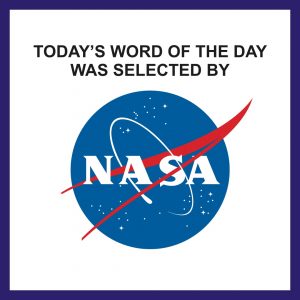Word of the Day
astronaut
noun
a person engaged in or trained for spaceflight.
Why NASA chose astronaut
Calling all astrophiles! Today, March 2, NASA begins accepting applications for their next class of astronauts. Do you have what it takes to become a "star sailor"? Watch this video to find out!
More about astronaut
Astronaut entered the orbit of English speakers in the late 1800s from the realm of science fiction. The first recorded instance comes from an 1880 novel by Percy Greg called Across the Zodiac: The Story of a Wrecked Record, in which Astronaut is the name of the narrator’s spacecraft. The sense under discussion today, “a person engaged in or trained for spaceflight,” emerged in the 1920s, decades before the launch of Sputnik (1957) marked the beginning of the Space Age. Astronaut is a compound of astro– “pertaining to stars or celestial bodies or to activities, as spaceflight, taking place outside the earth’s atmosphere,” from Greek ástron “star, constellation,” and –naut a combining form meaning “traveler,” from Greek naútēs “sailor.”

how is astronaut used?
In the latter part of the twentieth century, those fantasies [of conquering space] were replaced by actual vehicles which could venture into space and a daring new breed of hero—the astronaut.
From the very beginning this “astronaut” business was just an unbelievable good deal. It was such a good deal that it seemed like tempting fate for an astronaut to call himself an astronaut, even though that was the official job description.
astronaut


habitué
noun
a frequent or habitual visitor to a place: a habitué of art galleries.
More about habitué
Habitué, “a frequent or habitual visitor,” still feels very French in its spelling and pronunciation. Habitué is often used for someone who frequents places of recreation or amusement, such as poolrooms, bars, or used bookstores. French habitué is a noun use of the masculine past participle of the verb habituer “to frequent,” from Late Latin habituāre, a derivative of the Latin noun habitus “state, state of being, condition.” Habitué entered English in the 19th century.
how is habitué used?
Mr. Zegen is a hunter and gatherer of no mean talent, a gift he said he inherited from his mother, a habitué of garage, estate and yard sales, who scored the red-and-black rug on the floor in the living room.
habitué


intercalary
adjective
inserted or interpolated in the calendar, as an extra day or month.
More about intercalary
February 29 presents the perfect opportunity to get acquainted with the word intercalary, as this extra “leap” day, intended to reconcile the solar calendar with the seasons, is itself just that. The adjective intercalary, “inserted or interpolated in the calendar, as an extra day or month,” comes straight from Latin intercalārius, intercalāris, interkalāris of the same meaning. It is a derivative of the verb intercalāre, interkalāre “to intercalate, delay, postpone,” a compound formed of the familiar preposition and prefix inter, inter– “between, among” and the simple verb calāre, kalāre “to announce, proclaim, summon.” The Latin noun kalendae, calendae means “the calends, the first day of the month, the day on which were proclaimed the nones (the ninth day before the ides) and the ides (the fifteenth or thirteenth day of the month).” Intercalary entered English in the early 17th century.
how is intercalary used?
Today, you see, is a leap day, the intercalary anomaly that allows “leaplings” in their 80s to pretend they’re in their 20s ….
It closely follows the present calendar, but becomes perpetual by readjustment of the length of some months, equalization of the quarters and insertion of intercalary days.



